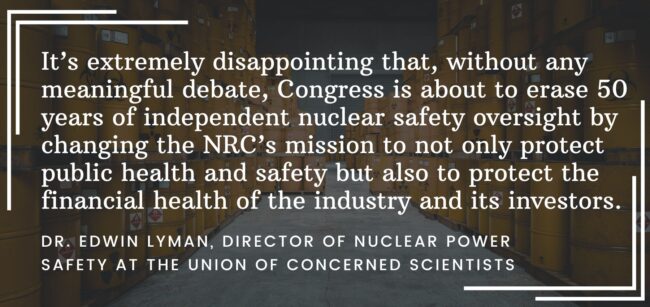by Nick Fitzmaurice
In 1978, Montanans passed an initiative with the support of 65% of the voters to require a vote of the public to approve any nuclear power generating facility in the state. For years, this initiative protected Montanans from outside interests seeking to exploit our state for their economic interests in nuclear energy. Unfortunately, in 2021, our legislature voluntarily gave up this protection, facing Montanans with a precarious future.
Now, Congress has slipped an extensive overhaul of the Nuclear Regulatory Commission (NRC) into a completely unrelated must-pass bill, lengthening a three-page Fire Grants and Safety Act to almost one hundred pages of dense material. The Accelerating Deployment of Versatile, Advanced Nuclear for Clean Energy (ADVANCE) Act now heads to the President’s desk to be signed into law. This issue deserves more scrutiny than was allowed in the hasty, quiet passage of the ADVANCE Act.

The Atomic Energy Commission was dissolved nearly 50 years ago in order to split the conflicting interests of necessary regulatory duties – tasked to the NRC – and promotional interests of the industry, which were folded into the Department of Energy (DOE). Under the ADVANCE Act, the NRC is directed to revise its mission statement to effectively deprioritize consideration of safety. The NRC must now jeopardize its regulatory process by prioritizing efficiency and the nebulous theoretical benefits of nuclear energy to society alongside its primary duty as the backstop to ensure the safety of this technology. This creates a balancing act of competing interests in which the industry’s promotional interests could override and undermine reactor safety, especially under the wrong administration.
Just before the bill’s impending passage, Dr. Edwin Lyman, director of nuclear power safety at the Union of Concerned Scientists (UCS) said, “It’s extremely disappointing that, without any meaningful debate, Congress is about to erase 50 years of independent nuclear safety oversight by changing the NRC’s mission to not only protect public health and safety but also to protect the financial health of the industry and its investors. Just as lax regulation by the FAA — an agency already burdened by conflicts of interests — can lead to a catastrophic failure of an aircraft, a compromised NRC could lead to a catastrophic reactor meltdown impacting an entire region for a generation.”
Without adequate transparency, Congress is taking us down a path with tremendous risks to society, public health, and the environment. This costly endeavor holds a shaky promise of producing marketable electricity from theoretical unproven and experimental technology called small modular reactors. Previously promised advances in nuclear technology have repeatedly proven to be outrageously expensive boondoggles, enriching a few while costing utility ratepayers billions. As it turns out, nuclear energy is the most expensive form of utility-scale electricity generation. At best, this bill will lead to increasingly expensive electricity rates in the coming decades, with American taxpayers further subsidizing the expensive energy generation through federal tax dollars. At worst, we will face an intersectional disaster of social injustices, geopolitical turmoil, and environmental devastation brought on by damaging uranium speculation, international proliferation of weapon-grade nuclear fuel, and mass production of radioactive nuclear waste with no permanent storage or disposal solution.
Nuclear energy is not the solution to a changing climate. Proven lower-cost alternatives already exist in renewable wind and solar energy, energy efficiency, energy storage, and transmission system improvements. These technologies are cheaper, quicker to implement, and reduce climate-warming emissions without the tremendous challenges of radioactive waste and nuclear proliferation issues. Best of all, these technologies are readily deployable, unlike nuclear energy with its unproven designs that would take at least a decade to begin producing energy.
The recent Supreme Court ruling overturning a long history of the courts deferring to the expertise of federal agencies such as the NRC and instead placing complex, technical decisions in the hands of unqualified judges makes this overhaul of the NRC even more troubling. Government agencies are now facing tremendous uncertainty on whether regulatory decisions developed by staff experts will stand up to the scrutiny of scientifically unqualified judges. Add to that the uncertainty of future presidential administrations which may act in ways wholly unforeseeable and contrary to science, and we have a recipe for disaster. We are entrusting our future leadership to make the existential decision of whether a foreign entity is to be trusted with potentially weapon-grade enriched uranium fuel. Now is not the time to introduce additional ambiguity into the directive of oversight agencies as crucial to the safety of the United States as the NRC.

